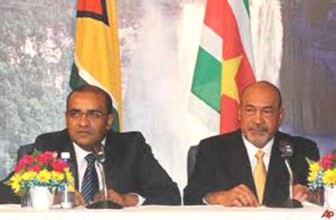President Bharrat Jagdeo yesterday refused to name the country that he said asked Guyana’s assistance in arresting Suriname’s President Desi Bouterse when he visited here.
“I’m not gonna say that now,” he said, responding to a question from this newspaper at a press conference at State House. The Head-of-State said he was not the only person from “our side” present when the request was made “but I don’t want to name that country.”
Late last month, Jagdeo revealed that he refused a request to facilitate the arrest of Bouterse during a visit here. “A particular foreign nation asked us if we will arrest the President of Suriname when he comes here because he is wanted… and I said to them no. I said maybe you can get some other country to do this,” he had said.

Both the US and The Netherlands, where Bouterse was convicted of drug trafficking, have since denied asking Jagdeo to arrest Bouterse.
Cables sent by US diplomats and released by WikiLeaks allege that Bouterse, who was convicted for drug trafficking in The Netherlands in 1999, remained involved in the drug trade until 2006. They also alleged that he was cooperating with Khan. The cables said that the two men were believed to be involved in various murders and plots to murder former Surinamese Minister of Justice Chandrikapersad Santokhi and Procurer General Subhas Punwasi, who were responsible for a clampdown in drug crime. The cables also alleged that Khan, who is now serving time in a US prison for drug trafficking, traded guns for drugs with Revolutionary Armed Forces of Colombia (FARC).
Jagdeo was asked whether he was concerned about reports that Bouterse when he was opposition leader was meeting now convicted drug trafficker Roger Khan.
“I don’t give much credence to WikiLeaks. The Americans don’t confirm or deny it, so why should I give credence to WikiLeaks?” Jagdeo responded yesterday. “I’ve seen how frivolous it has been, talking about people’s dogs and their girlfriends and stuff and I wonder if that’s how you determine foreign policy. So this is why, until there is verified source, I’m not going to put all my eggs in that basket,” he said.
Jagdeo said that he has made it clear that Guyana and Suriname will strengthen relations. He said that whoever the president of Suriname is, he will work with him. He said that he found Bouterse a good partner to get things moving between the two countries because the Surinamese President is prepared to move relations beyond the borders and talk about other things.
Last month at the opening session of the Guyana Defence Force’s annual officers’ conference, Jagdeo was asked how the release of WikiLeaks cables would affect the country’s relationship with Suriname and the agreements that have been inked with Bouterse.
There, Jagdeo told the officers that he would be “happy” to see “whatever comes out on Guyana” in the WikiLeaks cables because it exposes how policies affecting other countries are made in the developed world based on impressions of ambassadors. “An ambassador can go into a room and write about people’s dogs, the leaders’ dogs or how many girlfriends he has and they would go to cocktail circuits and send back reports about impressions about people within high offices across the government.
“They can come to a meeting and report what you have not said… and that gets up to the capital of the country and then policies in relation to the countries are made or influenced on the basis of these reports,” Jagdeo had said.
He had said that this was how the developed countries conduct their business, while noting that the cables expose how “frivolous” and “fickle” and how “in-transparent” “some of these things are.”
The president said the cables are not something that people love to talk about as “they” don’t want many countries to pay attention to them. “But what it will do, it will change American diplomacy and hopefully it will make diplomacy from the developed world more transparent,” Jagdeo had said. He had further opined that the cables will trigger some major shift in the way diplomacy works or alternatively more secured communications.









